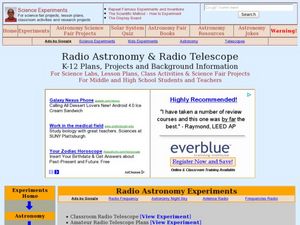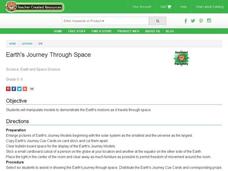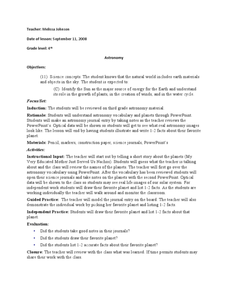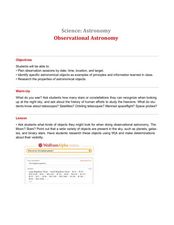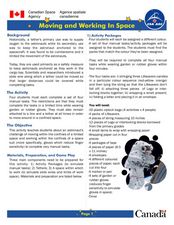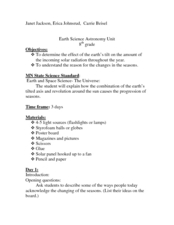Curated OER
Radio Astronomy and Radio Telescope
Students construct a simple radio telescope. In this astronomy lesson, students explain how this telescope works and what information it collects.
Curated OER
Earth's Journey Through Space
Students arrange various pictures of the Earth to identify its journey through space. In this Earth's rotation lesson, students use models of the Earth and demonstrate its journey through space. Students complete the worksheet about the...
Curated OER
Making Regolith
You may not be able to take a field trip to the moon, but that doesn't mean your class can't study moon rocks. Using graham crackers as the moon's bedrock and powdered donuts as micrometeorites, young scientists simulate the creation of...
Curated OER
Our Sky Clock
Students explore space science by completing a worksheet in class. In this astronomy lesson, students discuss and identify star patterns in the night sky and relate these patterns to the approximate time they appear. Students complete an...
Curated OER
Impact Craters: Holes in the Ground!
Middle schoolers simulate crater formation through a lab activity. In this space science lesson, students calculate how much energy is transferred during meteorite impact. They identify different factors affecting the size and depth of...
Curated OER
Stellar Evolution and the Fate of Earth
Eighth graders identify the different stages in the life cycle of a star. In this astronomy lesson, 8th graders read H-R diagrams and analyze data. The describe how the Sun's evolution will affect Earth in the future.
Curated OER
Moon Mining
Go on a moon mining expedition from the safety of your classroom with this space exploration simulation. Using simple models of the moon's surface prepared ahead of time by the teacher, young scientists are challenged with locating and...
Curated OER
Astronomy
Learners complete a series of activities to better understand space studies. In this space science activity, the teacher is provided with a number of activities for students to complete such as finding words that begin with the prefix...
Curated OER
Observational Astronomy
Students research about the characteristics of celestial bodies using a database. In this space science lesson, students collect data such as brightness, apparent color and size by observing the night sky. They share their findings with...
Curated OER
Moving and Working in Space
Young scholars complete four tasks with certain restrictions. In this astronomy instructional activity, students explore different ways that astronauts can anchor and maneuver in space. They recognize the challenges they face from day to...
Curated OER
Earth Science Astronomy Unit: Seasons on Earth
Eighth graders describe how the Earth's position causes seasonal changes. In this astronomy lesson, 8th graders explain how solar radiation varies depending on the season. They create a collage or poster on each of the Earth's four seasons.
Curated OER
Start the Space Flight Time Line
Students research space flight exploration and technology. In small groups, they research a significant event from early time until the start of the space age. A class time line is created from the research groups.
Curated OER
Astronomy
Students explore space science by utilizing education software. In this moon cycles lesson, students discuss the importance of the moon and the different phases we observe from earth. Students demonstrate the earth's orbit by creating a...
Curated OER
Distance in Space
Sixth graders explore space science by measuring distances between planets. In this solar system lesson, 6th graders view a Bill Nye video and discover the conversion between the metric system and imperial measuring systems. Students...
Curated OER
Kids Astronomy
In this astronomy word scramble worksheet, students examine the 16 letter groupings and use the decoder to help them reveal the 16 astronomy terms listed at the bottom of the worksheet,
Curated OER
Hubble Space Telescope
Students investigate the history and use of the Hubble Space Telescope. They take a quiz in order to establish in any prior knowledge. Students conduct research to find information in conjunction with participating in class discussion...
Curated OER
Space Facts
Students read space facts and click on the links to research more about space objects. In this space lesson plan, students read about comets, planets, the moon, and more.
Curated OER
Make a Spaceship
Students create a spaceship, satellite, or space station. In this space lesson plan, students consider design elements for buildings and objects in space. Students use K'Nex, Legos, or other household materials for their creation....
Center for Math and Science Education
Solar System Launch
Trying to understand the vastness of outer space can be quite a challenge for young scientists. Help put things in perspective with this cross-curricular activity as students work in pairs creating scaled models of the solar system,...
Curated OER
Understanding the Cosmic Microwave Background (CMB)
How did our universe really begin? Explore the Science Big Bang Theory and Cosmic Microwave Background (CMB) with this multiple activity-based lesson that demonstrates that the increase of density due to the decrease of temperatures,...
Curated OER
Black Holes
Students explore what black holes are and how gravity is associated with them. In this space lesson plan students are given enough information to imagine a journey to a black hole.
Curated OER
The Magic School Bus Out of This World
Students learn along with Ms. Frizzle's class. In this Magic School Bus lesson plan, students explore craters that objects of different sizes and weights (marbles, Ping-Pong balls, and aluminum foil balls) create.
Glynn County School System
Cosmology
The past, the present, and the future ... there's so much to discover about the galaxy. Scholars learn about the creation of the universe, its current structure, and how it is changing. The PowerPoint presentation begins with a...
Curated OER
Why Do We Have Night?
Learners engage in a fun, creative way to discover how the Earth moves. This lesson helps students explain why there is day and night. It can also create curiosity to further study the solar system and eclipses!


